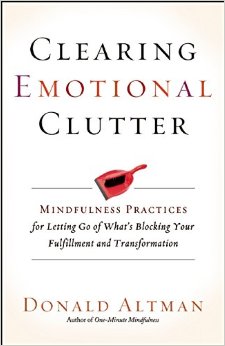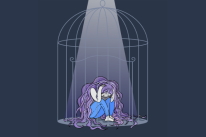
UPDATE – The winners for this giveaway are:
- C
- Lori Pacheco
When I was in my early twenties, I spent three months in a residential treatment center in a last-ditch effort to heal from depression and bulimia. Among many different treatment modalities, I participated in an experiential therapy that involved a ropes course and other adventure activities.
One day, along with a dozen other frail women, I strapped a backpack full of tennis balls on my back and climbed to the top of a rock wall. It was hard enough to walk on some days; getting to the top with what felt like ten cats clinging to my back took everything I had in me.
It was only when I completed the task, exhausted, that I understood the point of this draining exercise.
Our therapist then instructed us, one by one, to open our backpacks and toss each ball down to the ground, naming each an emotion that had caused us pain.
“This is my shame,” I yelled. “This is my anger. And this is my self-loathing.”
This metaphorical emotional unloading, combined with the energetic release that often follows extreme exertion, brought me a lightness of being that I’d never before experienced.
I had lived my life like the climb up that wall—weighed down by my emotions—and I had a glimpse of what it felt like to be free of them.
Still, while the exercise was liberating, I didn’t know how to recreate that feeling of emotional freedom in my everyday life.
Years later, I learned that mindfulness could provide the peace I desperately craved. I learned that I could fully embody the present moment, and see the people and things right in front of me without filtering them through my fickle emotions. I learned that I no longer had to live trapped inside a mind that constantly bombarded me with disempowering stories about my painful past.
No one has to live that way. And the good news is, clearing that “emotional clutter” doesn’t require a daily trip up a rock wall.
We can all overcome our toxic patterns and find freedom from the old pains and traumas that have weighed us down. Mindfulness is the key, and anyone, at any age, in any circumstances, can learn to practice it and reap the benefits.
In his new book Clearing Emotional Clutter: Mindfulness Practices for Letting Go of What’s Blocking Your Fulfillment and Transformation, author Donald Altman combines modern neuroscience with ancient practices to show how habits and patterns can be modified with only a few minutes of attention daily.
It’s a powerful book that can hep anyone release their emotional pain to find happiness, fulfillment, and peace.
I wish I’d found this book, and these practices, years ago, as they truly are life-changing.
I’m grateful that Donald took the time to answer some questions about his work and his book, and that he’s offered two free copies for Tiny Buddha readers.
 THE GIVEAWAY
THE GIVEAWAY
To enter to win one of two free copies of Clearing Emotional Clutter:
- Leave a comment below
- For an extra entry, tweet: Enter the @tinybuddha giveaway to win a free copy of Clearing Emotional Clutter http://bit.ly/1SLXcyB
*US winners will receive a physical book in the mail; winners outside the US will receive an eBook.
THE INTERVIEW
1. Tell us a little about yourself and what inspired you to write this book.
Mindfulness has helped me immensely in my life. I got on this path when I was going through a difficult life transition and found myself repeating an old, toxic pattern. It’s that idea that wherever you go, your problems always follow you. That is, unless you do something about it!
Around that time I met a Burmese Buddhist monk—the Venerable U. Silananda—who had been teaching mindfulness in the U.S. since the 1970s. He possessed a palpable sense of compassion and availability that made me ask the question: How does someone become like that?
When I had the opportunity to ordain with him as the head of the monastery, I jumped at it. Although I was in the monastery for a short period of time, it was an experience that changed my life direction because I was primed and ripe for the experience of looking inward.
I wrote my first spiritual book while at the monastery, and continued to train with one of the monks afterward. I’m very grateful for the transformative experience the monks provided for me, which helped me nurture greater compassion and connect with my purpose. Now, my writing is focused on helping others find joy and fulfillment.
Clearing Emotional Clutter is an important book for me because it integrates cutting edge brain science and research with the ancient practice of mindfulness. It shows that you don’t have to go into a monastery to transform your life, overcome past negative clutter, and rewire your brain.
2. How do we accumulate “emotional clutter,” and why do we need to clear it out?
No one can control what happens in life. There are losses, aging, and challenges throughout every stage of life, not to mention the daily wear and tear of stress. What we can do is to respond skillfully by not letting the emotional clutter pull us into states of dis-ease and unhappiness.
By clearing out clutter, we can transform even difficult moments and respond to life in a way that helps us find the inherent joy that is present.
3. You talk about getting off the emotional elevator. What do you mean by that?
You can think of your emotions like an elevator that takes you up and down. What moves the elevator? What old programs are running in your head that push the buttons on your elevator to that it moves you up and down? Something good happens in your life and the elevator goes up. Something bad—even a perception of something being bad—and the elevator shoots down. But what if you could control that yourself?
This book helps you decide who and what you are going to let push your emotional elevator buttons. Letting others push our mood elevator buttons can be exhausting. We’re not in control of our own elevator. Clearing away clutter means you get free from old emotional clutter programming and ways of thinking.
4. In Chapter Two, you introduced a tool called “Inner-Facebooking.” Can you elaborate a little on this and share an example of how it’s helped you personally?
Facebook is a wonderful way to post and put up for others what’s happening in our lives. In the same way, we are constantly putting up mental posts in our minds—through our thoughts and beliefs—that represent a kind of second Facebook: An Inner-Facebook, which shapes how we experience the world, ourselves, and others.
If your Inner-Facebook posts are unhappy and unflattering, no wonder you feel bad and depressed. I have a whole chapter about noticing your Inner-Facebook posts so you can be more aware. Inner-Facebooking is a skill that helps you to emotionally regulate. Then you can change your Inner-Facebook posts to be more positive and accurate.
Personally, I’ve gotten better at noticing my own inner-Facebooking posts. For example, my luggage was lost when traveling recently. But rather than respond to the highly reactive and anxious thoughts that my mind posted in that moment, I was able to step back and make a new, more realistic and helpful post that said, “My luggage is going to be found. Besides, in the big scope of things, losing my luggage isn’t that big a deal.”
5. In Chapter Four, you wrote, “Much of the clutter of discomfort, discontent, and conflict that we experience in life comes from our unwillingness to accept things as they are.” I think we often equate acceptance with giving up. How can we simultaneously reduce the clutter of resistance while working to make positive changes in our lives?
Acceptance is about realistically viewing your situation. It’s about surrendering to the truth that you may not have control over the situation. You recognize that it is what it is. That does not mean you are giving up. Submission, on the other hand, is about giving up.
Acceptance allows us to surrender to the truth of our situation. So, if you’re frustrated at being caught in a traffic jam on the freeway, for example, you can have acceptance of what you’re experiencing instead of fighting with it. This means that you can then move forward in a more realistic and effective way instead of getting all stressed out and carrying the experience with you throughout your day.
6. You devoted an entire chapter to “family emotional clutter.” How do we accumulate this type of clutter, and how does it negatively impact our lives?
In my workshops I always ask, “Does anyone here have a difficult person in your life?” Everyone raises their hands.
Family emotional clutter can negatively impact our future relationships and how safe we feel around others. If you’ve had negative relationship issues that have been a pattern in your life, that’s a sign you need to work on that clutter. Repairing this will lead to more loving, healthy, fulfilling, and secure relationships.
7. What’s one thing we can do to begin releasing “family emotional clutter” to avoid these negative consequences?
First, we can recognize that all people have suffered, even that person in your family who may have mistreated you. In fact, your family’s suffering may go back centuries. So, rather than feeling permanently victimized, it’s important not to pass on the wave of suffering in your family, and to know that you can heal.
I believe that we can get a new brain download by finding benefactors in our lives. We can learn how to attune and alter our brain’s social and emotional rewiring. It’s a helpful process that I describe in one of the Lifestyle Tools found in Clearing Emotional Clutter.
8. You talk about friendships as a tool to release emotional clutter. How and why can our relationships help with this, and how can we help other people release their emotional clutter as well?
Research shows that having friends is the key to a happier life. The three seeds that make friendship grow and mature are the seeds of trust, acceptance, and empathy.
Trust is essential, and that takes time to develop, so you need patience and real mutuality in a relationship.
Acceptance means not being so demanding. It means accepting that everyone has flaws. Sometimes you need to let things to as a foundation for friendship.
Lastly is empathy. Empathy is what lets you really feel connected to a friend. Develop these and you’ll develop friendship.
9. In the chapter devoted to listening, you shared an acronym, HEAR, that can help us keep our emotional clutter out of conversations and “enter a more spacious and less defensive awareness.” Can you tell us a little about that and how it helps?
Talking can be clutter that sometimes blocks understanding and deeper meaning. If we are to remove clutter in the moment, we need to be present with all our senses, especially listening. This acronym is designed to help us when we’ve stopped listening—like during an argument, or when we’re feeling defensive or caught up in our own opinion. It goes as follows:
H- Hold all assumptions. Empty your ego and get curious. Set your personal beliefs and assumptions aside for a few minutes and take a more objective perspective as you listen.
E- Empathy to engage, not enrage. With empathy, you can enter the emotional world of the other person so you can understand them better rather than try to deny or devalue what they are feeling.
A- Absorb and accept. Understanding, with openness. Let in the ideas of the other person. Acceptance doesn’t mean you have to agree, but that you can accept this is the other’s belief.
R- Reflect, then respect. Take time to pause before you respond. Take a step back so that you can think about what you’ve heard. Then, respond respectfully and with kindness.
10. In Part 3 of the book, you explore ways to prevent new emotional clutter. What’s one practical thing we can all do daily to de-clutter?
I especially like the idea of being faithful to this moment. You can be 100% committed to whatever you are doing. Uni-task, so you are fully present with this moment. This means fidelity to the breath, to walking, to eating, to working. Whatever you are doing, you can do so fully, without your mind being one place and your body being someplace else.
That means that when you walk, walk. When you eat, eat. When you drive your car, drive. Cut down on the distractions and do one thing fully. In this way you can appreciate and savor even the most ordinary moments and that “in-between” time that is an important part of our days and lives.
You can read more about Clearing Emotional Clutter on Amazon here.
FTC Disclosure: I receive complimentary books for reviews and interviews on tinybuddha.com, but I am not compensated for writing or obligated to write anything specific. I am an Amazon affiliate, meaning I earn a percentage of all books purchased through the links I provide on this site.
Woman jumping image via Shutterstock
About Lori Deschene
Lori Deschene is the founder of Tiny Buddha. She started the site after struggling with depression, bulimia, c-PTSD, and toxic shame so she could recycle her former pain into something useful and inspire others to do the same. You can find her books, including Tiny Buddha’s Gratitude Journal and Tiny Buddha’s Worry Journal, here and learn more about her eCourse, Recreate Your Life Story, if you’re ready to transform your life and become the person you want to be.
- Web |
- More Posts













 Though I run this site, it is not mine. It's ours. It's not about me. It's about us. Your stories and your wisdom are just as meaningful as mine.
Though I run this site, it is not mine. It's ours. It's not about me. It's about us. Your stories and your wisdom are just as meaningful as mine.
I love the sound of this book – thanks for sharing. As someone who has started practising mindfulness on a daily basis I can definitely say it’s helped me come to accept my life the way as it is at the moment.
Emotional Elevators – definitely resonates. I deal with this more frequently than I care to admit. One moment, you’re moving up, and then all it takes is one metaphorical person (thought), and you’re plummeting floors.
I think I need this book in my life right now. I came here to this site by accident and I want to stay.
I loved the comment and visual image about emotions being like an elevator taking you up and down-who is the operator?! This sound like a fabulous, insightful and thought provoking book. I would love to win a copy!
I would love to win a copy of this book! I feel it could really help me in this time!
Seems like a wonderful book! I like the elevator example and the HEAR acronym. I feel we are so hijacked by countless thoughts and emotions at any given moment so to uni-task may cut down the clutter as the author says.
it’s taken awhile…two steps forward three step back, but, if you believe there’s good enough reason to take those new two more steps…you will discover a strong , beautiful you , that was there all along …I would enjoy receiving a copy of Clearing Emotional Clutter!
It sounds like a great book, that I would love to win 🙂
Thank you for this site. It has tremendously helped me in my time of need. This seems like a wonderful book and would love to receive a copy. Thank you for this opportunity!!
Thank you for everything you do 🙂
This is wonderful!
Thank you sharing this interview. I am trying to learn to practice more mindfulness in my daily life. I also loved the HEAR strategy and tips on friendship.
This book sounds great, and something I could really use. I’d love to win a copy!
Looking forward to reading this one!
Thank you for the opportunity! Love your site & read it faithfully! 💗
I love the idea of inner-Facebooking as an exercise in mindfully evaluating our thoughts. We must remember that everything we post on Facebook gets recorded. Similarly, every thought gets stored somewhere in our brains and will inevitably influence our future thoughts. This is a great reminder to choose carefully the thoughts that we wish to record, but also to forgive ourselves for any less-than-positive thoughts that we may experience from time to time, treating ourselves with kindness and compassion, just as we would treat a friend who is going through a rough time and chooses to share his or her story on social media. I’m looking forward to reading this fascinating book.
It sounds like this book holds a lesson I really need to learn right now. Thank you.
Sounds like an interesting book. Plese enter me in the giveaway.
Love your site and mailouts, I often share them with friends through Facebook or email.
I am going to be 50 in a couple of weeks and I am finaly starting to get it and to be ok with myself. Here’s to getting older and wiser. 😉
Claude
I would love, love, love to win this book. I have a lot of people I help emotionally speaking that I am looking for any and all information on dealing with emotional/feelings/highly sensitive/empathic people. I someday want to help kids deal with these things also (volunteer). Thank you for writing this book.
I would love to read this book (and will pick one up if I’m not a lucky winner). Mindfulness has always been this buzz term I’ve heard in so many conferences, emails, tweets, therapy sessions, etc. I’ve had moments like the author where you see the struggle after facing it through a metaphorical exercise but haven’t been successful in the upkeep of such practices. As I continue to struggle “up the wall”, I need to find a way to not have such a burdensome journey.
I have so much emotional clutter it may take a lifetime to clear it! Overwhelming to say the least. I hope I win, but if I don’t, I will certainly look for this book.
I facilitate mindfulness groups for people with substance use issues and look forward to reading this!
I work at a residential treatment center for adolescents and we do DBT. DBT has four modules and one is mindfulness 🙂 This book would be a great read and I would be able to let our kiddos here read it too. Thanks for having this giveaway!
This book sounds like just what I need to read right now. Thank you for the opportunity.
Love Tiny Buddha! Enter me into the drawing please!
This giveaway could not have come at a better time <3. Filling entirely weighed down by the past, present, future. Thank you TB
Sounds fabulous – I have too much clutter right now, inside and out! 🙂
I have just started this journey of mines.
Love the elevator analogy. Beautiful!
I think this would be a great book to read; motivation and guidance in letting go.
This book sounds interesting! I would love to read it 🙂
Great interview! I’ll definitely be reading this… Exactly what I need right now.
Would love to win the book. Sounds like what I’ve been looking for. Thanks for writing it and the opportunity to win it.
I’ve got more emotional clutter than I want to deal with…growing up in an abusive family with an alcoholic parent. Now dealing with 2 grown children who struggle with their own issues, maybe I could pass along some helpful advice. What an awesome book!
I’m happy I found Tiny Buddha. My whole life I’ve felt unwanted and “off” and the information I’ve read has helped me a lot. I still have a long way to go to live the second half of my time in peace and contentment. I think the book would be a good tool to reach that goal. Thank you for this site!
Sounds like an amazing book and something I need to read!
I would love to win a copy of this book! As a future social worker graduating at the end of the month, this would be perfect for my office and practice!
Interesting take on all of this mind clutter. Looking forward to reading this book!
Very interesting story about the emotional baggage we carry and emotional detox(I will surely try that for once).This book would be a great tool for me to sift through the emotions and get get over my emotional Sinus !! Looks like a lovely book
It sounds like this could be a very interesting read.
I would love to have a copy of this book. There are times when I get so anxious about things. I need tips to learn to breathe and let go. It will help a great deal. Thanks
This book sounds like it fits with a lot of the work I’ve been doing with NVC.
Sounds like a great read!
Thank you, it looks like an interesting book.
This would be so helpful to win and read, thank you! xx
Shared on twitter https://twitter.com/bohofoxbabe/status/720740855573643265
Rock on! I really love this interview and would love to learn more. Bring on the work!
I am so filled with clutter! Emotional and physical! It’s so difficult to change! It seems like when I try, something devasting happens in my life and sets me back to start all over again!
It seems there’s always SOMETHING and it totally clutters my mind and saddens me! I feel no peace! Constant worry! I need to climb a wall and toss my balls out too… Clear away all my emotions. I need to feel peace and tranquility
My mindfulness journey started last Fall and I am always looking for interesting books. My life is full of clutter and this book looks like it would be of great help to me. I look forward to reading it!
another book, wonderful. Uni-task, love it!